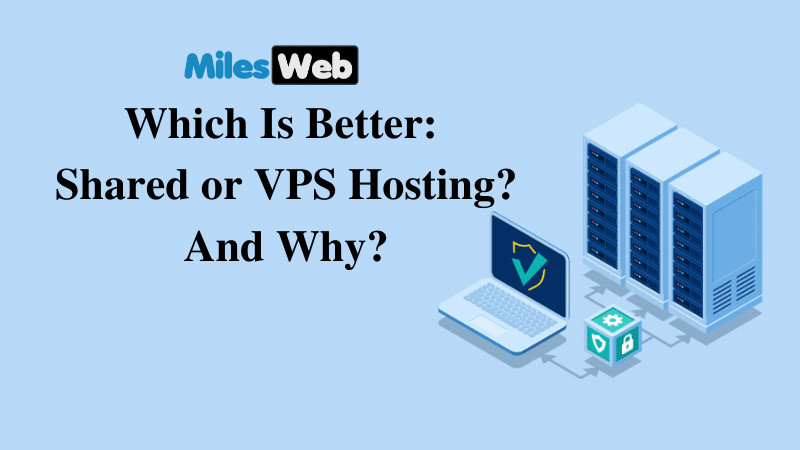When it comes to web hosting, it might be confusing to know whether to go with VPS or shared hosting, depending on if you’re a blogger, a small business owner, or a CEO.
Knowing your options for SEO web hosting can assist you in avoiding getting junky outcomes when it comes to creating your website. Regardless of whether you’re beginning from scratch or revamping an existing website, you’ll need to look for a hosting plan that will maximize the effectiveness of your site.
If you’re uncertain about which of the several web hosting options would be the best fit for your needs, you’ve come to the correct spot. These guidelines are perfect for anyone utilizing a shared hosting account and have no idea what alternatives are available.
We’ll go through the benefits of each so you can decide which is best for you.
Shared hosting is concerned with sharing the server resources with other websites. There are several resources available on a shared server, including disc space, bandwidth, CPU power, a database, and RAM.
Shared hosting is the most basic and least expensive type of web hosting includes Windows and Linux Shared hosting.
Due to restricted bandwidth, if your website gets a lot of traffic on the same server as others, it may become slow.
When the server isn’t too busy, you may make use of all the resources it has to offer. However, you must be prepared for when everyone logs in, making things get hectic.
However, despite the benefits of shared hosting, there are times when it is constrained.
1. Easy Setup
With shared hosting, getting started is easy. It’s already set up if you’re only planning to operate one website (for example Magento or WordPress admin panel).
Standardized software like cPanel, which is pre-installed on nearly all shared hosting settings, makes it easy to take backups or add FTP users in the future.
2. Budget-friendly
In comparison to other hosting plans, the shared hosting options are much too cheap. Using a shared hosting plan saves money since you don’t have to pay for additional server space or resources.
3. 24/7 Customer service availability
There are web hosting service providers that offer round-the-clock assistance to their clients and users. The web hosts handle all the technical and non-technical hosting concerns, so you don’t have to worry about any web hosting-related issues.
MilesWeb, the most dependable web hosting business in India, offers the finest customer service.
4. Managed server infrastructure
With shared hosting, you can be a power user without having to worry about what’s beneath the surface. The hosting service provider is in charge of dealing with issues including system outages, maintenance, and upgrades.
If you own a small business, shared hosting is the ideal option. Also, if you’re an affiliate marketer, blogger, or web designer, shared hosting is the way to go. for a novice, shared hosting is usually a better choice because the danger of wasting money on unnecessary plans and resources is much lower.
Due to the fact that each form of web hosting has its own distinct qualities, let’s have a look at VPS hosting.
Virtual private server (VPS) hosting
VPS hosting splits the actual server into many virtual blocks, and each user receives a virtual segment. Website security is improved, and interference from other websites is minimized using a Virtual Private Server (VPS). VPS hosting is more costly than shared hosting, but it offers more power and flexibility.
With cheap managed VPS hosting, you can set up all the software you need, modify it according to your needs, create databases and webpages, manage the users, and keep everything safe without having to worry about upgrades or downtime.
Benefits of using VP hosting plans:
1. Resource scalability
VPS hosting options come with scalability built-in. Scalability is the capacity to increase resources as needed to meet changing business needs. When an e-commerce site has a spike in traffic, the resources on that e-commerce site can be scaled up accordingly.
2. Secured website
Because a VPS is a closed system, it offers greater security than shared hosting. Viruses can readily spread up and across a directory structure after infecting a shared server or a website hosted on it. Due to the dedicated IP, one compromised website on a VPS hosting server will not affect other websites on the server.
3. Full control over the server
If you use VPS hosting, you can add and delete apps as you see fit. Furthermore, you are free to pick the operating system of your preference. Installing Node and making a few changes is all it takes to make the switch from PHP to Node. Databases may be upgraded or moved, a free SSL certificate installed, and website security strengthened under VPS hosting.
When to use a VPS hosting plan?
It’s safe to say that VPS hosting is your best bet if you intend to grow your business. The more money you have to spend on your site, the better off you will be with a virtual private server (VPS). Another situation where VPS hosting makes sense is if you foresee a lot of traffic to your website.
Compare VPS hosting to shared hosting in terms of resource availability, security, control, and website speed, and you’ll see that VPS hosting comes out on top. In addition, VPS hosting offers advantages like scalability and flexibility that are not included in shared hosting plans. If you’re looking for reliable VPS hosting, consider exploring unmetered VPS hosting options, where you can enjoy uninterrupted performance and unlimited traffic.
The Bottom Line:
If you are a beginner in the web hosting industry, a shared hosting package is always the best option. However, if you already have a website and are seeking the finest service for your growing company website, VPS hosting is the way to go.


